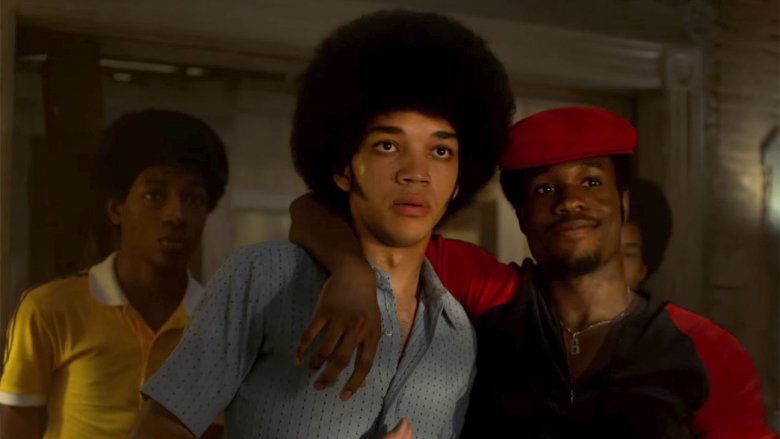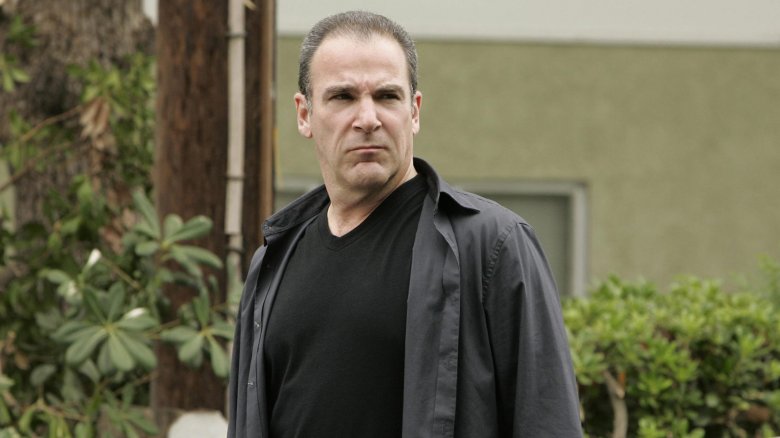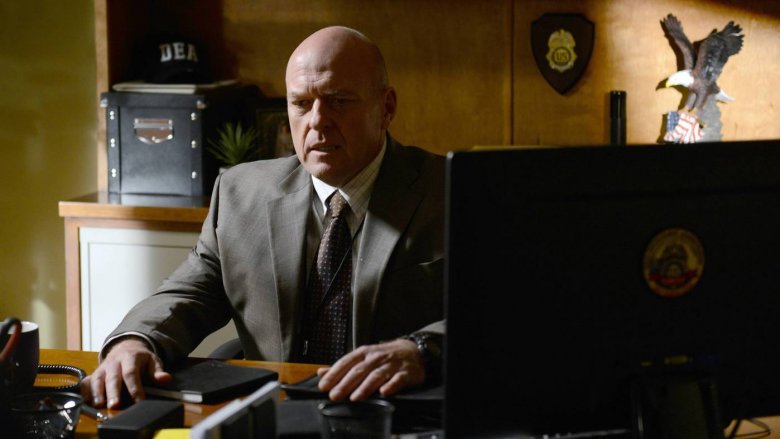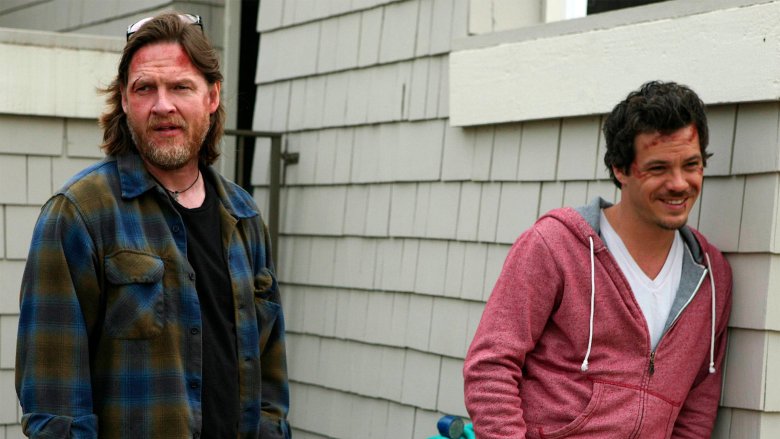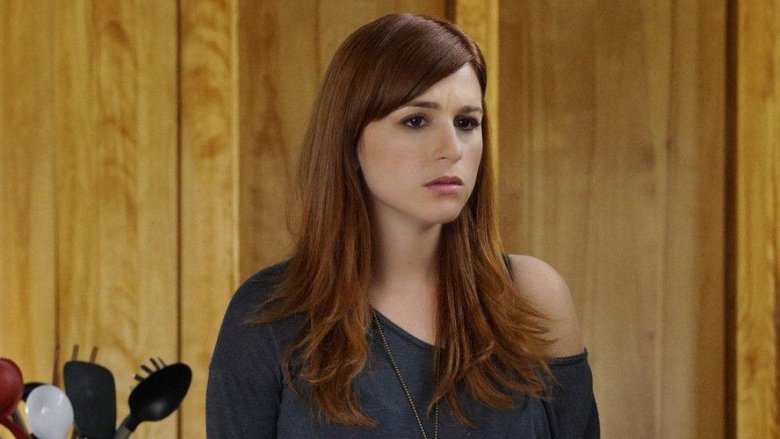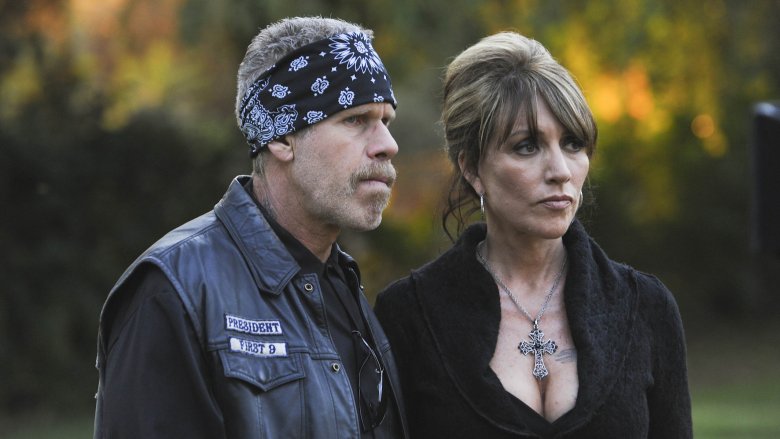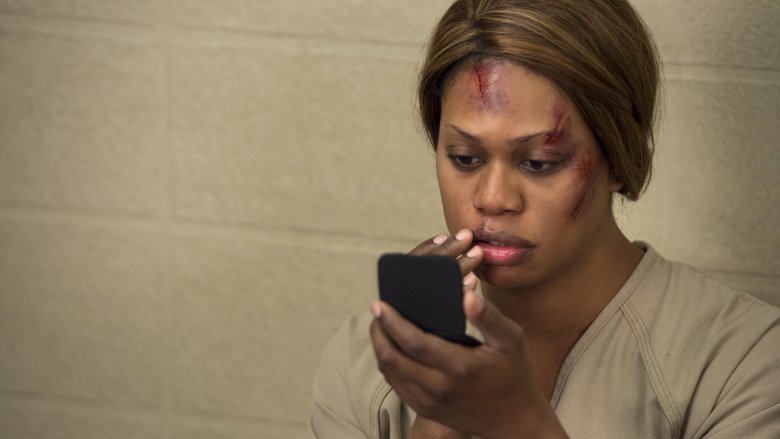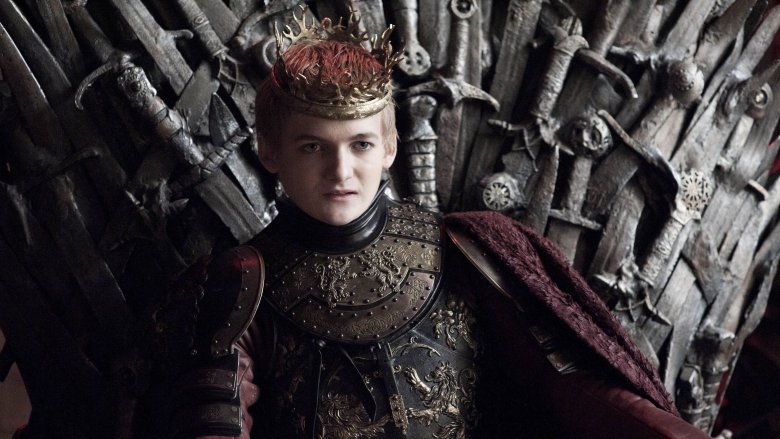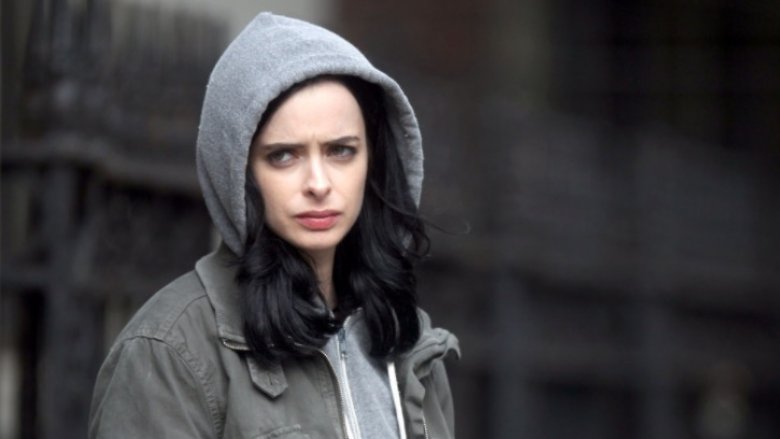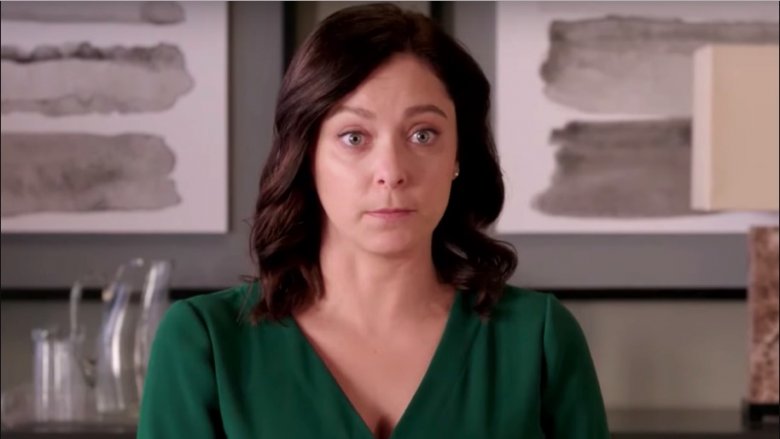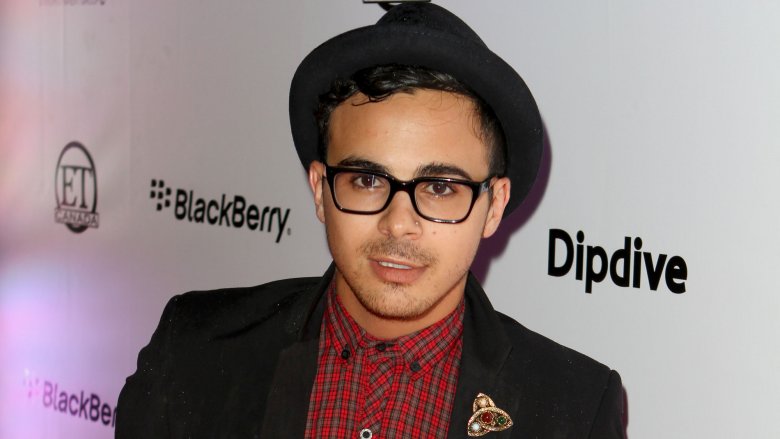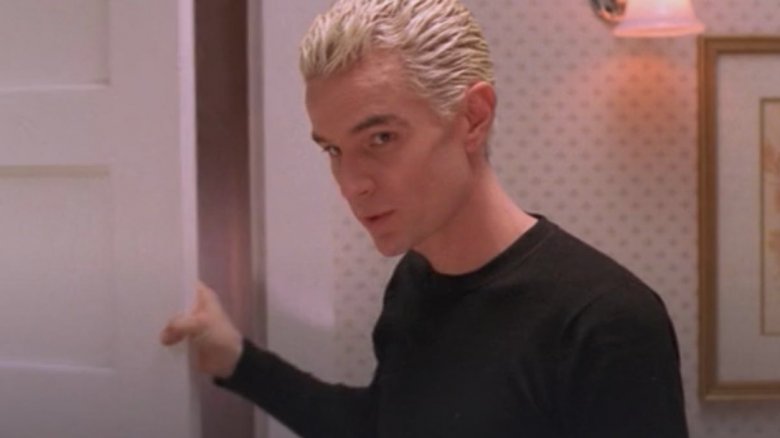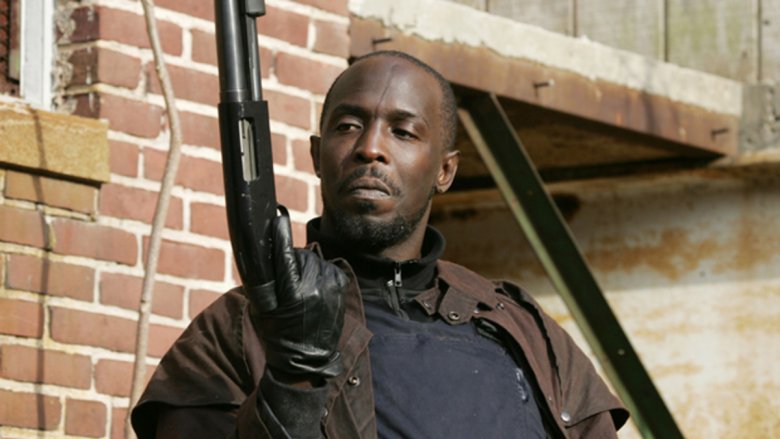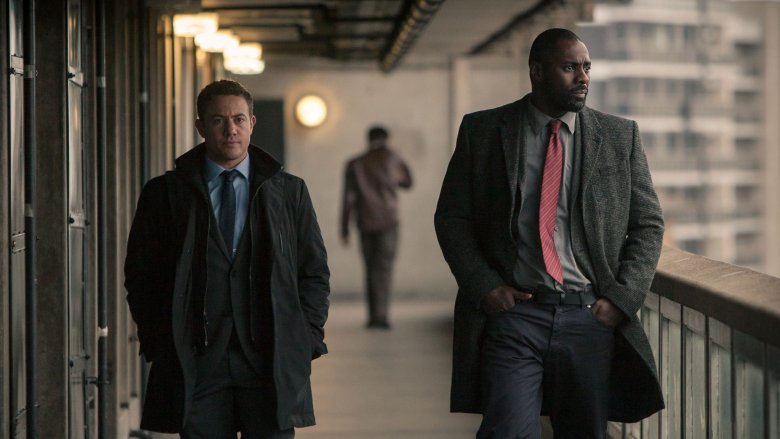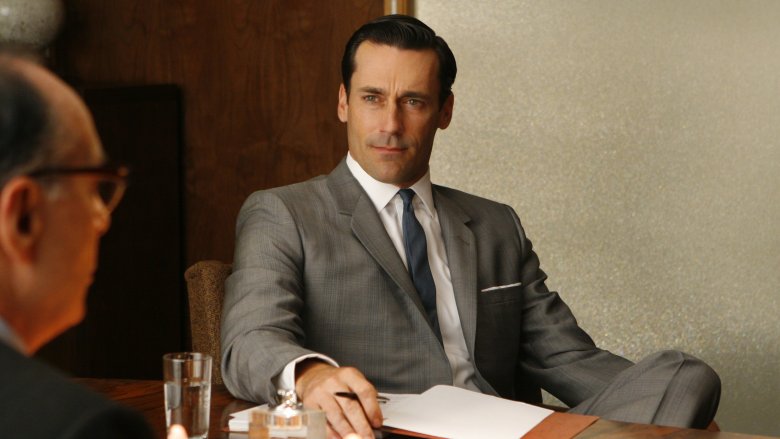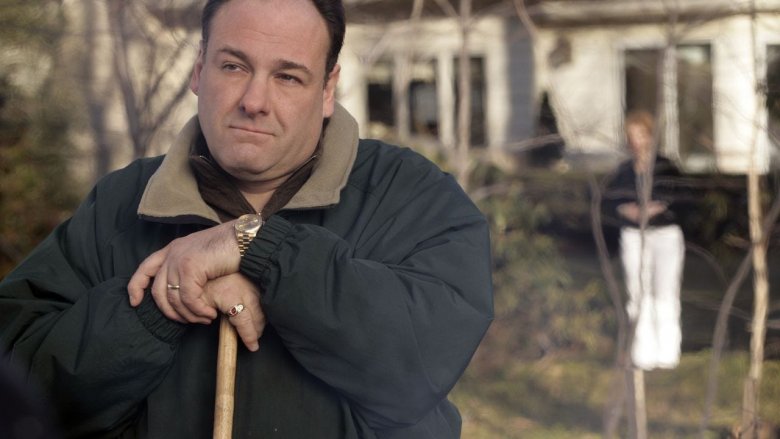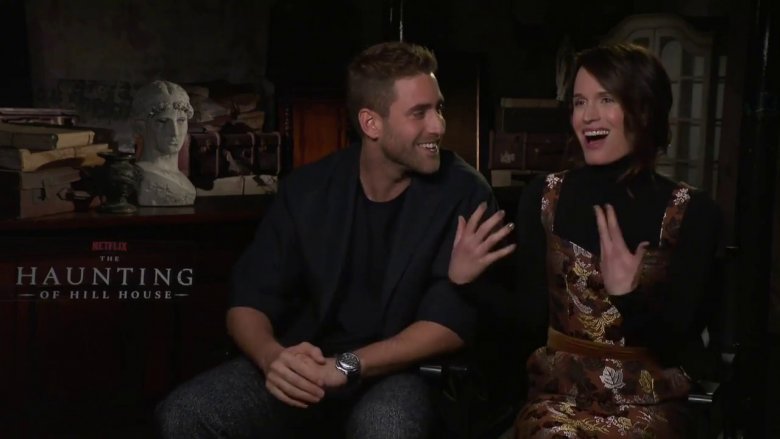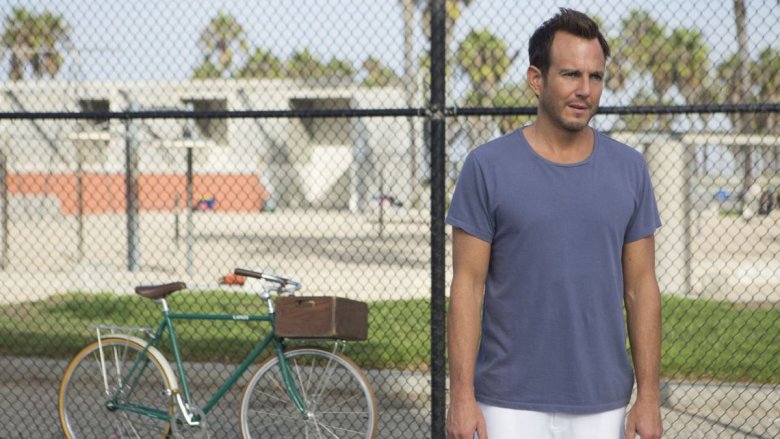TV Roles That Really Messed With The Actor's Head
Acting is all about getting inside a character's head and investing a performance with that empathy. It's a difficult job to become a different person when the cameras are rolling and then turn that mindset off the moment a director yells "cut," and the hectic schedule of filming that most TV shows require makes that job even harder. Actors need to stay in character for weeks and even months at a time, and while that emotional investment can lead to some jaw-dropping performances, it can also wear on a performer's psyche.
The best actors infuse their characters with parts of their own personality, turning a role into a reflection of themselves. While that can lead to better performances overall, it can also lead to emotionally draining scenes and existential terror where the role ends and the actor begins. From actors who found themselves as depressed as their characters to stars uncomfortable with onscreen violence, here are TV roles that really messed with the actor's head.
Justice Smith in The Get Down
The Get Down might have fallen victim to its own massive budget and co-creator Baz Luhrmann's busy schedule, but the show's mythic portrayal of the birth of hip-hop was a delight for all 11 episodes of the short-lived series. One of the main appeals of the show was its commitment to creating a dense setting for the characters, a New York City closer to the way people mythologize the city than the mundane reality. That commitment to world-building was also reflected in the actors, who practiced choreography on set in a reconstructed Queens neighborhood, and even involved some of the actors wearing period-appropriate underwear.
As series lead Ezekiel Brown, actor Justice Smith committed to the role with gusto for the long hours of filming. Unfortunately, that dedication to craft ended up taking an emotional toll on the young actor when his method acting techniques started to erase the distinction between himself and the character he was playing. According to Smith, "The lines get blurred and you're like, 'What is me and what is the character? Am I really like this or is that just him?' My biggest fear was, 'What if I don't come back? What if I don't return to who I am?'"
Mandy Patinkin in Criminal Minds
Crime procedurals often thrive in the comforting rhythm of repetition. Following the same characters as they investigate criminal after criminal, often in storylines ripped directly from recent headlines, can be surprisingly engrossing. The hook for Criminal Minds that set it apart from shows like NCIS (boat crimes) and Law & Order: Special Victims Unit (sex crimes) was that the show focused on understanding the psychology of the killers. It clearly proved effective.
The show's in-depth look at criminal minds proved to be a bit too in-depth for actor Mandy Patinkin, however. In an interview, he confessed that working on the show was one of the biggest regrets of his career. "I thought it was something very different. I never thought they were going to kill and rape all these women every night, every day, week after week, year after year," Patinkin said. "It was very destructive to my soul and my personality. After that, I didn't think I would get to work in television again." Patinkin would return to television again in Homeland, but his character on Criminal Minds was famously killed offscreen, so there's not much chance of him returning to that particular role.
Dean Norris in Breaking Bad
While there are plenty of shows that have had dark character arcs, Breaking Bad broke the mold by following protagonist Walter White's series-long descent into meth-dealing supervillainy. The show's chock-full of dark moments and grim performances, so consider this your spoiler warning for one specific example: In season 3, Hank, Walt's DEA brother-in-law, is nearly shot to death and ends up crippled for part of the next season. The character's former upbeat attitude and macho dialogue is replaced with sullen glares and moody silences, which continues episode after episode.
Actor Dean Norris found himself increasingly enveloped in the newly grim outlook of his character, which necessitated weeks of filming for the arc. "You are constantly dark for 15‑hour days, being just depressed as a character and being mean to my [onscreen] wife," Norris said. "I was just constantly in this kind of pissed-off mood. That whole Season 4 for me was not pleasant." Still, Norris' dedication to his craft on the show did lead to one of the mineral-related clips of the show, so at least it didn't go to waste.
Donal Logue in Terriers
Not all TV roles that mess with an actor's head are grim and gritty; some just involve an actor getting too emotionally invested. Donal Logue found himself in that situation while portraying washed up former police detective Hank Dolworth in Terriers. Logue's been a fantastic character actor for years, but the dense writing and close cast relationships in Terriers helped the actor put a lot of himself into the character; his onscreen sister was even played by Logue's real sister, Karina Logue.
Unfortunately, while the show was much loved by its fans, it was canceled after only one season and Logue was left to consider a future in acting that didn't involve Hank Dolworth. Logue even considered quitting Hollywood for good, saying, "I couldn't really afford to do it, but I just felt like quitting. Because I'd gotten so super emotionally attached to that show." Logue actually went through on his decision to quit, and wound up becoming a licensed truck driver before returning to Hollywood.
Aya Cash in You're The Worst
Arguably the best show with "worst" in the title, You're The Worst follows four characters of dubious moral character as they enjoy the hipster pleasures of upscale Los Angeles and deal with various romantic hijinx. While the show often skews more towards comedy, an arc in season 2 featured protagonist Gretchen dealing with clinical depression. Actress Aya Cash confessed that although she didn't experience many dark days while filming her character's onscreen struggles, she did experience some dark days while watching the show.
"I didn't feel particularly brought down by the shooting of it, but I did actually have a very hard time, to be honest, when it aired; feeling sort of similar to how Gretchen was feeling," Cash said. "I had sort of a delayed reaction to it all and then felt I had to be sort of up for it when I actually myself felt down."
Katey Sagal in Sons of Anarchy
Very few actors have had the opportunity to explore the character range shown by Katey Sagal. From lazy housewife Peggy Bundy in Married... With Children to purple-haired mutant Leela in Futurama, Sagal's been a mainstay on television for years. As Gemma Teller, the matriarch of a biker gang in Sons of Anarchy, she was given the chance to flex her acting chops in a more dramatic fashion than past roles. In season 2 of the biker drama, Gemma is attacked by a rival gang in a viscerally unpleasant sequence that affects the character for the rest of the season.
In an interview, Sagal admitted that "it required me to visit some pretty dark places but just seemed to hang around with me after I left work... Before you know it, you're kind of visiting these places over and over again on a regular basis. Yeah, that was definitely kind of hard to shake."
Laverne Cox in Orange Is the New Black
While Orange Is the New Black is frequently more lighthearted and funny than one might expect given the show's prison setting, it's also never shied away from the deeply unpleasant realities of imprisonment and sexism. Following a group of women imprisoned in a women's correctional facility, the show features the various intersections between race, class, gender, and sexuality. In season 3, a feud finds Sophia, a trans woman, sent to solitary confinement ostensibly for her own protection after a violent attack.
Actress Laverne Cox, herself transgender, admitted that although the storyline was important to showcase, it was deeply upsetting to film. "When I read this episode, I was just in tears," she recalled. "I bawled reading it because it was deeply triggering for me... As trans people of color, there's so many different layers of that. So the trauma of that was just very real and raw for me."
Jack Gleeson in Game of Thrones
There are plenty of loathsome villains in the history of television, but very few have been quite as young and quite as twisted as King Joffrey on Game of Thrones. Even among a cast full of violent monsters, the young king stood out as a repugnant character. Actor Jack Gleeson seems to be as kind-hearted as his character is not, since he's gone on record as feeling very conflicted over the violent acts committed in the show.
As Gleeson said in an interview with Rolling Stone, "You tend to abstract yourself from the creepiness of it when you're playing it, but when you see it on television, it sends shivers down my spine... I would like to try and defend him, but I would have a pretty hard job doing it." Gleeson even retired from acting after his time on the show ended, which was probably for the best, considering the kind of retirement his character faced.
Krysten Ritter in Jessica Jones
While Krysten Ritter's got a bit of a knack for playing self-destructive characters like Chloe on Don't Don't Trust the B—- in Apartment 23 or Jane in Breaking Bad, Marvel's Jessica Jones is arguably one of her best. The show follows the titular superpowered private detective as she struggles with trauma in a world of unbreakable men and manipulative monsters. Playing a character that deals with such dark experiences required Ritter to really invest herself in Jessica Jones' loneliness, which involved a difficult transition.
"It definitely takes a toll because I'm more bubbly and alive and zestful and I like to have a good time. So after a while, you're like, 'Oh my God, I'm getting really depressed,'" Ritter said. "And I just had to move across the country, so I'm in an apartment that doesn't have my furniture. I'm not around my friends. I spent a lot of time walking around doing the scenes by myself in my apartment."
Kit Harington in Game of Thrones
If you were a bit upset by the end of Game of Thrones, you're not the only one. Kit Harington, the actor behind the "King of the North" Jon Snow, also had some issues with the finale. We won't spoil it if you're behind on your viewing, but suffice it to say that Harington became pretty attached to the character that he spent nearly a decade portraying. The end of the series and the end of that relationship led to Harington struggling with stress and alcohol abuse, and he checked himself into a rehab facility soon after. According to an earlier interview with Esquire, the actor's struggle to separate himself from the character has been a long-running effort. After filming the final episode, Harington said, "The weirdest bit was when we came off set and they started taking the costume off and it felt like being skinned. It felt like they were unceremoniously, for the last time, ripping off this character."
Thankfully, it seems that Harington's time in rehab went well, as he was seen around the grounds with his wife. Jon Snow might "know nothing," but luckily Harington knew enough to get help when he needed it.
Rachel Bloom in Crazy Ex-Girlfriend
When you're the co-creator and star of a television show that puts out over a dozen episodes per season, you're under a lot of stress. When you're also playing a character that has the same initials as you while also performing in a weekly musical, well... you might be able to relate to the stressful identity issues that Rachel Bloom experienced while working on Crazy Ex-Girlfriend.
The show follows Rebecca Bunch (Bloom), a high-powered lawyer who drops everything to move to West Covina, California to follow her childhood boyfriend. As the show continues, viewers learn that Rebecca is suffering from major mental issues, which eventually culminates in a suicide attempt. Bloom struggled with performing the scene in which her character tries to overdose on pills, telling The New York Times that it was really difficult for her. "I've had depression and anxiety and other things, but I've never seriously contemplated suicide. Even just trying to get myself to that place — it was very unpleasant. I burst into tears at one point." Thankfully, her emotional turmoil was worth it. The arc scored plenty of acclaim with critics and viewers, and the show itself has broadened the conversation around Borderline Personality Disorder, the illness Bloom's character suffers from.
Adamo Ruggiero in Degrassi: The Next Generation
One of the core elements of acting is finding a way to portray a character that's unlike you. It sounds obvious, but it can be an incredibly difficult thing for any actor to honestly portray someone who's lived a life vastly different from their own. What's a little less obvious is the difficulty in portraying a character that's a little too similar to yourself. Such was the case with Adamo Ruggiero while playing Marco in Degrassi: The Next Generation. In Degrassi, Marco is gay, and while Ruggiero would eventually come out in 2008, he was still struggling to reconcile his own closeted sexuality with the sexuality of his character at the time.
Ruggiero told Fab magazine that it was hard for him to see the positive impact he was having on gay youth without being out himself. "I was receiving fan mail from kids who wrote to thank me, saying 'I came out to my parents and friends because of you.' Since Marco came out before I did, I felt like a fraud. I hadn't opened up to my own parents, yet I was inspiring a generation to do just the very opposite."
James Marsters in Buffy The Vampire Slayer
While everyone has a story or two about the time a Hollywood actor was rude to them, for the most part, actors are pretty kind. Unfortunately, a good-natured personality can make it hard to tap into the kind of darkness that actors sometimes need to muster for a role. That was certainly the case for James Marsters while playing the manipulative vampire Spike in Buffy The Vampire Slayer.
While the character goes through plenty of goofy moments throughout the show, Spike also goes to some horrifying, dark places. In one episode, Spike tries to rape Buffy. Marsters told the AV Club that it was incredibly hard for him to perform the scene. "It was the hardest day of my professional life. I was curled up in a fetal position in between takes. I can't watch scenes like that. I choose not to. I won't go to a movie that has something like that. It's a specific hot button for me. It just really makes me crazy. It was really hard." While he was ultimately happy with the way the scene benefitted the larger storylines for Buffy and Spike, Marsters clearly struggled with disconnecting from the character during filming.
Michael K. Williams in The Wire
While The Wire was generally pretty down to earth in terms of its presentation of the drug trade, political pressures, and systemic injustices of Baltimore, one character seemed to walk straight out of a mythic western. That would be Omar, played by Michael K. Williams. While other characters dealt with broken wiretaps or new rivals dealing drugs on their corners, Omar walked around Baltimore with a shotgun and his own whistled theme song. But while the character he played might have been larger than life, Williams himself was struggling while he acted.
In an interview with NPR, Williams went deep into how the character became a crutch for him as he battled drug addiction. "So [when] The Wire and the character of Omar ended, I had zero tools, personally speaking, in how to deal with letting that go. I... definitely wore that dark energy that Omar was — he was a dark soul, a tortured soul — and I just... lived in that and that's what people was attracted to. The lines got blurred." Luckily for Williams, he was able to work through his issues with a church pastor, and has remained more at peace even while he's played similarly intense characters in the years since.
Idris Elba in Luther
Idris Elba's been lucky and talented enough as an actor to have appeared in plenty of iconic roles. The cool and collected Stringer Bell in The Wire, the gruff and charismatic Stacker Pentecost in Pacific Rim, and many, many more. Still, one of his best roles would have to be DCI John Luther in Luther. As Luther, Elba hunts some of London's most twisted and homicidal criminals, all while balancing a complicated relationship with another ruthless killer that's obsessed with him.
It's a dark role in a dark show, and it's no surprise that the tone occasionally gets to Elba. The actor told Radio Times that "It's a tough show to make; it's not fun making Luther. It's very grueling. Tough, long hours and obviously because of the nature of the type of show it is, it deals with murder, it's depressing if I'm honest." It might not be easy to make, but considering what Elba has said about his Marvel film roles, it's probably worth the effort.
Jon Hamm in Mad Men
Much like the animated opening that preceded each episode of Mad Men, so too did Jon Hamm's Don Draper continue to fall through life during the show. The character constantly slipped up and made poor decisions, and brief flirtations with doing the right thing almost always ended up being empty promises. While that might have been frustrating for the viewers, it seems to have been even more frustrating for the actor behind the mad ad man.
Hamm told The Hollywood Reporter during a roundtable that "Obviously it's no fun to play a person who only makes the right decisions all the time, but it can be difficult to watch somebody, time and time again, who just continually makes [the same] mistakes. I think it got progressively more difficult for me. As Don's downward spiral continued, it became kind of relentless, and that takes its toll on your psyche." That dark effect on his psyche might explain why Hamm spent the next few years following Mad Men appearing in sitcoms. We all practice self-care in our own unique ways.
Emilia Clarke in Game of Thrones
Kit Harington isn't the only GoT actor who struggled with separating their identity from that of their character. Emilia Clarke also felt like she had a lot to live up to while portraying Khaleesi, Daenerys Targaryen, First of her Name, Breaker of Chains, et cetera. In a frank interview with The New Yorker, Clarke revealed that she was under massive amounts of strain and stress while filming the early seasons of Game of Thrones due to two brain hemorrhages. The pressure of such a massive role early in her career combined with the physical strain of acting in the hot desert climate while recovering from brain surgery led to morbid thinking.
"In moments of extreme stress, my fear of dying was dialed up to a million," she recalled. "There were many moments where I would just take one of my hair or makeup girls aside and just go, 'I think I'm dying, and I'm not. Can you just hold my hand? Could you just look at me and tell me that I'm all right?'" Thankfully, Clarke was able to soldier on through the pain and stress and deliver some of the best performances in the series.
James Gandolfini in The Sopranos
As Kurt Vonnegut once wrote, "We are who we pretend to be, so we must be careful about what we pretend to be." While some actors don't worry about that literary idiom, plenty more find it inordinately stressful to play the antiheroes and outright villains that they're occasionally asked to portray. In the case of James Gandolfini, there's an argument to be made that he more or less created an entire genre with his work as the tortured mobster Tony Soprano. After The Sopranos aired, it became common to refer to the wave of "difficult men" television shows as the Golden Age of Television. Whether or not you buy that, you can't argue that Gandolfini didn't throw himself into his role.
According to Brett Martin's book Difficult Men, Gandolfini routinely would storm off set, disappear entirely, or curse endlessly between takes. Martin writes, "In papers related to a divorce filing at the end of 2002, Gandolfini's wife described increasingly serious issues with drugs and alcohol, as well as arguments during which the actor would repeatedly punch himself in the face out of frustration." At least his work frustrations weren't wasted; although Gandolfini tragically passed away of a heart attack in 2013, he's left a deep body of work behind.
Oliver Jackson-Cohen and Elizabeth Reaser in The Haunting of Hill House
It can take some serious emotional preparation for some people to make it through a horror movie. Whether they're superstitious, afraid of blood, or just easily scared, some viewers are just more susceptible to spooks. As it turns out, actors are too. During the filming of Netflix's The Haunting of Hill House, actors Oliver Jackson-Cohen and Elizabeth Reaser confessed to Metro that they found themselves emotionally affected by all the dark subject matter that they had to work through on set.
Jackson-Cohen even began seeing ghosts of his own, saying, "Obviously you know, because we're actors, we've got stupid imaginations... In prep I started to think that someone was sat at the end of my bed in the night and stupid s**t like that." Meanwhile, Reaser didn't see any ghosts, but she did experience fatigue: "'I just can't sleep because, like you say, when you're drumming that stuff up for so long, you kind of get a hang-up on it. It's like your body doesn't know that you're pretending." Here's hoping these actors get plenty of time to relax before they head back to performing in horror films and television shows.
Will Arnett in Flaked
When actors build a character based on themselves, it can get dicey pretty quickly. Where the line gets drawn between fiction and reality can be difficult for anyone who pretends for a living. For actor Will Arnett, Flaked originally seemed like the perfect way to exorcise some of his personal demons regarding alcoholism and his (at the time) recent divorce from his wife Amy Poehler. In Flaked, Arnett plays Chip, an alcoholic who spouts AA mantras while secretly drinking on the side. Unfortunately, while playing Chip, Arnett relapsed after 15 years of sobriety, in part because he believed that he needed to do so in order to live the part properly.
Worse, when the show premiered to negative reviews, Arnett had trouble accepting the criticism of the character as separate from criticism of himself. He told The Hollywood Reporter that "When you have a [reviewer] say, 'It's not even a good depiction of sobriety — that they do a better job on [CBS'] Mom,' you're like, 'What are you talking about?' This is actually f**ing happening [to me], you a**hole. This is actually happening in real time — as quickly as we can shoot, it's happening."

